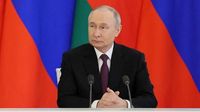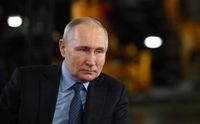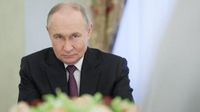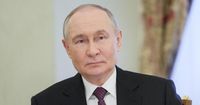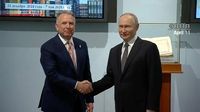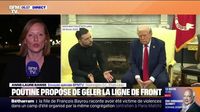In a significant turn in the ongoing conflict in Ukraine, Russian President Vladimir Putin has proposed conditions under which he would agree to halt the invasion that began on February 24, 2022. This offer, reported by the Financial Times on April 22, 2025, emerged from a meeting in early April with U.S. special envoy Steve Witkoff in Saint Petersburg.
Putin has indicated a willingness to freeze the current front line and renounce total control over four Ukrainian regions—Donetsk, Luhansk, Kherson, and Zaporijjia—if the United States recognizes Russia's annexation of Crimea and prohibits Ukraine from joining NATO. This proposal marks a potential shift in the dynamics of the conflict, but it comes with significant caveats.
According to the Financial Times, the Russian president's concessions are contingent upon the U.S. meeting his major demands. "Moscow could renounce its claims on areas of four partially occupied Ukrainian regions that remain under Kyiv's control," the report stated. However, European officials have expressed skepticism, warning that Putin might be using this offer as a strategic bait to coax former President Donald Trump into accepting Russia's conditions.
"There is a lot of pressure on Kyiv right now to concede certain points so that Trump can claim victory," an unnamed European official told the Financial Times. This sentiment reflects the complex interplay of international politics surrounding the conflict, where the stakes are high not only for Ukraine but also for U.S.-Russia relations.
Ukrainian officials, including President Volodymyr Zelensky, have reiterated their stance that there is no room for negotiation over Crimea, which has been under Russian control since its annexation in 2014. Zelensky stated, "There is nothing to discuss. It goes against our Constitution. This is our territory." This firm position underscores the deep-seated tensions and the challenges that any peace negotiations face.
Putin's offer to freeze the front line is seen by some analysts as a tactical maneuver rather than a genuine step toward peace. Dmitri Peskov, the Kremlin's spokesperson, dismissed reports of the proposal, stating, "There is a lot of misinformation being published at the moment, including in respected publications. That is why one should only listen to primary sources." This dismissal raises questions about the reliability of the claims and the motivations behind them.
The backdrop of these negotiations is the ongoing struggle for territorial control in Eastern Ukraine, where Russian forces have made significant inroads. The four regions mentioned—Donetsk, Luhansk, Kherson, and Zaporijjia—are critical to Putin's strategic objectives, and any concession regarding them would be a considerable shift in his approach.
While the U.S. has not formally responded to Putin's conditions, discussions about recognizing Russian sovereignty over Crimea have surfaced in diplomatic circles. Such a move would represent a profound shift in U.S. foreign policy and could have lasting implications for the region.
The conflict has already led to significant humanitarian crises, with millions of Ukrainians displaced and countless lives lost. The prospect of peace, even under contentious terms, raises hopes among many who have been affected by the war.
As negotiations continue, the international community remains watchful. Allies of Ukraine, particularly in Europe, are calling for a complete restoration of Ukraine's territorial integrity, a stance that contrasts sharply with Putin's demands. U.S. Defense Secretary Pete Hegseth has previously labeled the idea of compromising on Ukraine's borders as "unrealistic," emphasizing the need for a solution that respects Ukraine's sovereignty.
The complexity of the situation is further compounded by the political landscape in the United States, where Trump's potential return to the presidency could reshape U.S. foreign policy in ways that might align more closely with Russian interests. The implications of this are profound, not just for Ukraine, but for global stability.
In conclusion, while Putin's proposal to freeze the front line offers a glimmer of hope for peace, it is fraught with conditions that may not be acceptable to Ukraine or its allies. The coming weeks will be critical as the international community navigates these treacherous waters, seeking a resolution that honors Ukraine's sovereignty while addressing the complex realities of the ongoing conflict.
